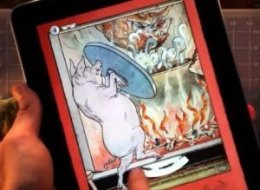What a thrill it was to have a Seabury graduate now teacher come to our library to work her storytelling magic with a group of alumni children!
The storytelling hour was part of a larger Christmas Keiki (children's) party, which included craft making and singing of Christmas carols, for kids of graduates.
I was happy to set the stage for Jos to work her magic.
Jos has collected children's books over the years, so I was interested to know which ones she had picked to tell. Both It's Christmas, David, and Snowmen at Night made the children giggle. Jos also read Polar Express (with bells for each child to help tell the story) and 'Twas the Night Before Christmas.
A nice little touch were the blank jigsaw puzzles Jos passed out to the children, so they could draw and color in their own snowman, as they listened to Snowmen at Night.
There's already talk about another storytelling event for next year, perhaps even a reader's theater, with more alumni teachers participating (Annie and Jennifer's names came up).
I'm always happy to provide the space to support readers coming up through the ranks. And the feeling that comes from reconnecting with alumni and their children via books and reading? -- Utter bliss ...
(◕‿◕✿)
For further reading:
Books boost kids’ behavioral health


